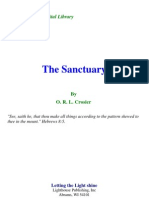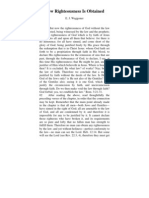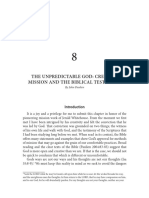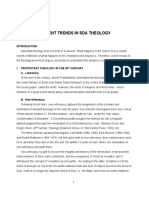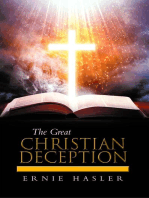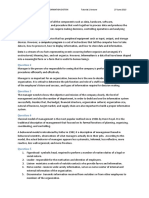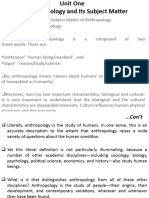Rebuttal To Ron Du Preez
Rebuttal To Ron Du Preez
Uploaded by
Eddie ArambulaCopyright:
Available Formats
Rebuttal To Ron Du Preez
Rebuttal To Ron Du Preez
Uploaded by
Eddie ArambulaOriginal Title
Copyright
Available Formats
Share this document
Did you find this document useful?
Is this content inappropriate?
Copyright:
Available Formats
Rebuttal To Ron Du Preez
Rebuttal To Ron Du Preez
Uploaded by
Eddie ArambulaCopyright:
Available Formats
Rebuttal to Ron du Preez
December 4, 2010
Comments about Ron du Preez on 3ABN - His interviews against the feasts 1. I marvel at the glowing description of the feast campmeetings that Ron has after attending them. He and Herbert Douglas seem to run out of wondrous descriptive words to tell of their experience when attending a feast-keeping camp meeting. Herbert Douglas said in reference to these meetings, the experience would be uplifting, being surrounded by passionate, earnest people seeking the Lord with all their hearts and following their convictions It is a thought provoking experience. Ron said many wonderful words like that, even more so. I am asking these two men who speak and write against the feasts, if you were hired to be fruit inspectors at an orchard, would you keep the bad fruit and do away with the good fruit? You cannot give such a glowing report of the average SDA church with a 7/11 song service (seven words repeated eleven times) and drums on the stage or the weakened down lesson study and watered down sermons.
2. On the interview on 3ABN, Ron du Preez made use of linguistic, syntax and word search. Any educated man can use this system to destroy any of our doctrines. I can use the same system to destroy what Ron is teaching. So his proof is suspect in the very beginning. His system can also be used to support any doctrine. He separated six of the feasts and left the Day of Atonement intact, just as Uriah Smith did in January 17 & 24,1888. When Ellen White was asked about that article in the Review, she said, Smith does not know what he is talking about: he sees trees as men walking therefore he takes those that have been placed in a false setting and binds them in a bundle as though we were discarding the claims of the law, when it no such thing 1888 Matt. Vol. 1 p.348. If the those means the six feasts that he was discarding, that she said was a part of Gods law, then he was placing them in a false setting.
3. Ron is not being totally honest with the listening audience. He only quotes the scriptures that support his teaching and does not give the full text in many cases. For example, 1 Cor. 5:7, he quotes our Passover is sacrificed for us. Being a sacrifice, it ended at the cross, according to Ron. Two times he quoted this verse 7 in the first hour of his interview with C.A. Murray on 3ABN. Had he read verse 8, it would have destroyed his teaching. It says therefore let us keep the feast without leaven. The word keep in our SDA commentary says the Greek meaning is let us continue keeping. Paul is saying, Let us continue to keep the feasts many years after the cross. In Acts of the Apostles p.390, 391, Paul is telling about keeping the feasts of Unleavened Bread with the Philippians, who were his Gentile converts. In our Bible Commentary Source book p. 362, it tells of John the beloved, Philip and his two daughters, Polycarp, and Polycrates all keeping the feast of Unleavened Bread. This was long after the turn of the century.
4. Ron proceeds to put all of the feasts, except the Day of Atonement, ending at the cross, but then went on to talk about the feast of Pentecost which was being kept by Gods people fifty days after the Passover and the cross. This is being inconsistent and making scriptures to lie.
5. Most of the anti-feast day articles are nothing more than straw men arguments. They are based on putting the feasts in the ceremonial law because of the many sacrifices done on them. At this point I am going to give background evidence as to how this erroneous teaching came to be.
6. In trying to solve the mystery of what took place in 1888, I recently discovered how that problem was connected to the Great Disappointment of 1844. Some Millerite pastors studied the feast days in connection with the sanctuary to find the date of the Day of Atonement. After the disappointment there was so much shame and embarrassment connected with the Jewish feasts that those who started the SDA church, decided to separate themselves from anything Jewish. There were several other groups that came out of that movement, one group still continues to keep the feasts today. James Whites very first Present Truth article that he published in 1849 was already teaching that the feasts were part of the ceremonial law. Neither the Bible or Ellen Whites writings agree that the feasts are part of the ceremonial law. Most of the older Millerite ministers favored the moral law in the book of Galatians which became the focal point of the many arguments that took place in the 1850s. When the new leadership came into power they changed the law in Galatians to the ceremonial law in order to nail the feasts to the cross. Gal. 4:8-10 is the only place in scripture where they could put Gods feast days in place of pagan feasts to which Paul was referring. This was a very wrong way to interpret these verses and caused many of the older ministers to defect and join some of the other groups. In 1888 Jones and Waggoner tried to clear up this cover-up and met with determined resistance from Uriah Smith and George Butler, who controlled the church at that time. This erroneous teaching that the feasts are part of the ceremonial law has become a teaching in the SDA church since 1860. To bring the teaching of the feasts back into the church again brings forth the same antagonistic spirit that Smith and Butler gave it in 1888. 7. Ellen White said they were not under the control of Christ but of another Spirit when they fought Jones and Waggoner. That should be a warning to those who are doing the same thing today. You may think you are doing the Lord a service but you may be fighting Him and His law instead. This is a highly condensed version of a study entitled, Exposing the Skeleton in the Closet of 1888. The above study has already gone all over the USA and Canada in the last four months. This is a 31 page study, well documented from Adventist sources except for one section from non-Adventist sources which tells about Adventist pastors who left the church, presumably over the feasts.
Ron said the feasts were for the express purpose for doing sacrifices. That really cheapens the true meaning of each of the seven annual feast days. Here is a miniature example of what the feasts mean to me. Each one deserves a separate study. 1. Passover: The Passover is to commemorate a deliverance from bondage and slavery and to us it means deliverance from sin. Jesus said , He desires to eat the Passover with us in the kingdom. 2. Unleavened Bread: The unleavened bread is to commemorate the manna in the desert and to remove the sin out of your life in a deliberate effort in the next seven days. My first keeping of the unleavened bread was a spiritual growth period for me. It set a pattern for continuing this spiritual growth . 3. Wave Sheaf: This teaches the resurrection of Christ and the first fruits of the 144,000. We are told to strive to be among them. 4. Pentecost: The giving of the law at Sinai and the Holy Spirit and Early Rain at Pentecost. And the giving of the Early and Latter Rain at the end of time, probably on the day of Pentecost. 5. Feast of Trumpets: This was to warn the people that they only had nine days left before their fate was sealed on the Day of Atonement. 6. Day of Atonement: This was the day they spent bowing down before the sanctuary in fasting and prayer. Praying that all things would be right with God so they would not be cut off. On this day they were cleansed from their sins of that past year. 7. Feast of Tabernacles: All is well, come and fellowship, living in booths and remember your wilderness years. Feast of Tabernacles is to be a joyous occasion, the fall crops are in and all is right with God. God invites us to stay an extra eighth day which looks forward to the marriage supper of the lamb, where a long silver table is waiting for us on that eighth day in the future in the kingdom. We are told in Zech.14: 16-18, that the wicked will be destroyed at the feast of tabernacles which means Jesus has come to take us home. This is highly condensed version of the meaning of the feasts. I hope some one sends this to Ron. If you want more information on this article, send us your e-mail address and we will send it to you free. E-mail address - pamagaem@directcon.net Norman Bradley 295-8148
You might also like
- Why Jesus WaitsDocument38 pagesWhy Jesus WaitsClay Brown100% (1)
- Eli Lilly Case StudyDocument9 pagesEli Lilly Case StudyNoopur BansalNo ratings yet
- The Ramik ReportDocument18 pagesThe Ramik ReportWelder Nac NacNo ratings yet
- Adventism and Biblical Perfection The DiDocument14 pagesAdventism and Biblical Perfection The DiRoberto Matos100% (1)
- M. L. Andreasen - Following The MasterDocument63 pagesM. L. Andreasen - Following The Masterwww.truthwarrior.de67% (3)
- Half A Century of ApostasyDocument500 pagesHalf A Century of ApostasyPete Warda94% (16)
- (JOHNS Warren H.) Ellen G White and Biblical Chronology (Ministry 1984-04)Document4 pages(JOHNS Warren H.) Ellen G White and Biblical Chronology (Ministry 1984-04)Nicolas Marie100% (1)
- Creeping Compromise by Joe CrewsDocument1 pageCreeping Compromise by Joe CrewsKer Ad James100% (1)
- Was Waggoner An Arian or Trinitarian - Robert J. WielandDocument5 pagesWas Waggoner An Arian or Trinitarian - Robert J. WielandpropovednikNo ratings yet
- Let History Speak - Donald K. Short - Word 2003Document114 pagesLet History Speak - Donald K. Short - Word 2003propovednikNo ratings yet
- A Warning and Its Reception - A.L. Hudson PDFDocument412 pagesA Warning and Its Reception - A.L. Hudson PDFchaplainnorris9010100% (1)
- Feast-Keeping and The Faithful: Should Christians Observe The Annual Feast Days?Document11 pagesFeast-Keeping and The Faithful: Should Christians Observe The Annual Feast Days?bibletruthinchristNo ratings yet
- O. R. L. Crosier - The SanctuaryDocument27 pagesO. R. L. Crosier - The Sanctuarywww.truthwarrior.deNo ratings yet
- Leroy MooreDocument8 pagesLeroy MooreRudika PuskasNo ratings yet
- Louis F WereDocument11 pagesLouis F WereRober Diaz100% (3)
- J.H. Waggoner EngDocument3 pagesJ.H. Waggoner EngGabriel BalutaNo ratings yet
- Jones - General Conference Bulletin Articles (1893-1903)Document960 pagesJones - General Conference Bulletin Articles (1893-1903)julianofabrizio100% (1)
- The Most Precious Message, A Compilation by A.T.Jones and E.J.WaggonerDocument12 pagesThe Most Precious Message, A Compilation by A.T.Jones and E.J.WaggonerKunedog1100% (1)
- E.J Waggoner-How Righteousness Is ObtainedDocument5 pagesE.J Waggoner-How Righteousness Is ObtainedDANTZIENo ratings yet
- How A Doubter Discovered That Ellen White Wrote Her Own BooksDocument8 pagesHow A Doubter Discovered That Ellen White Wrote Her Own BooksBreno P. FélixNo ratings yet
- J.N. Andrews The Great Week of TimeDocument14 pagesJ.N. Andrews The Great Week of TimeAndov DejanNo ratings yet
- Is Lying Ever Moral? Ron Du PreezDocument17 pagesIs Lying Ever Moral? Ron Du PreezMu YishengNo ratings yet
- John N. Loughborough - Great Second Advent MovementDocument478 pagesJohn N. Loughborough - Great Second Advent Movementwww.truthwarrior.deNo ratings yet
- Acts321 Org - Born Sinners Answers To Objections BookDocument108 pagesActs321 Org - Born Sinners Answers To Objections BookTheMedienNo ratings yet
- Rebellion by Ron SpearDocument80 pagesRebellion by Ron Spear7ccerna100% (2)
- History of Questions On Doctrines: Fidelity or CompromiseDocument20 pagesHistory of Questions On Doctrines: Fidelity or CompromiseClay Brown100% (1)
- Foundation Foundation: Our OurDocument32 pagesFoundation Foundation: Our OurDANTZIE100% (1)
- Ellen G White (Ed Lloyd & Leona Rosenvold) - An Adventist ApocalypseDocument250 pagesEllen G White (Ed Lloyd & Leona Rosenvold) - An Adventist ApocalypseJames ParkerNo ratings yet
- Seventh-Day Adventism (1850-1920) .Document51 pagesSeventh-Day Adventism (1850-1920) .Flávio FilhoNo ratings yet
- Is Last Generation Theology Progressive Adventism?: June 2017Document33 pagesIs Last Generation Theology Progressive Adventism?: June 2017Ovidiu DascaluNo ratings yet
- Hastings' Great Controversy Between God and ManDocument131 pagesHastings' Great Controversy Between God and ManKevin L. MorganNo ratings yet
- F. C. Gilbert - Messiah in His SanctuaryDocument318 pagesF. C. Gilbert - Messiah in His Sanctuarywww.truthwarrior.deNo ratings yet
- Preble - A Tract, Showing That The Seventh Day Should Be Observed As The Sabbath, Instead of The First DayDocument8 pagesPreble - A Tract, Showing That The Seventh Day Should Be Observed As The Sabbath, Instead of The First DayMarcos Silva100% (1)
- Why God Holds The WindsDocument8 pagesWhy God Holds The WindsMitrache MariusNo ratings yet
- Refuting The 2520 Day For A Year Time ProphecyDocument31 pagesRefuting The 2520 Day For A Year Time ProphecyUniversal Publishing AssociationNo ratings yet
- Desmond Ford - Section II Ford's Critique of WeberDocument7 pagesDesmond Ford - Section II Ford's Critique of Webercmcconnelldesign100% (3)
- Our Firm FoundationDocument32 pagesOur Firm FoundationstrawhatsNo ratings yet
- 3 Angels MessageDocument32 pages3 Angels MessageFrancesco MarquinaNo ratings yet
- What Is A Seventh Day Adventist Dennis PriebeDocument9 pagesWhat Is A Seventh Day Adventist Dennis PriebeEfren O AlialyNo ratings yet
- Larry KirkpatrickDocument51 pagesLarry KirkpatrickRudika PuskasNo ratings yet
- 25 Objections On The Sanctuary and Investigative Judgement AnsweredDocument18 pages25 Objections On The Sanctuary and Investigative Judgement Answered7ccerna100% (1)
- BOOK - 1888 ReExaminedDocument148 pagesBOOK - 1888 ReExaminedMarcos Peter Teixeira SoaresNo ratings yet
- (Ron Du Preez) A Fresh Look at The Fifth & Sixth Trumpet (Ponencia)Document46 pages(Ron Du Preez) A Fresh Look at The Fifth & Sixth Trumpet (Ponencia)Leandro Velardo100% (1)
- James White and The King of The NorthDocument3 pagesJames White and The King of The NorthMajjoni35yahoo.com Martinez Martinez100% (1)
- Paulien The Unpredictable GodDocument22 pagesPaulien The Unpredictable GodMartinez YanNo ratings yet
- The Sanctuary of The Bible. by J. N. AndrewsDocument6 pagesThe Sanctuary of The Bible. by J. N. AndrewsKunedog1100% (1)
- Behold He Cometh - F.D Nichol (1938)Document125 pagesBehold He Cometh - F.D Nichol (1938)titactNo ratings yet
- The Sanctuary by O. R. L. CROSIER PDFDocument32 pagesThe Sanctuary by O. R. L. CROSIER PDFjson hadgesNo ratings yet
- Thieves in The Church - Joe CrewsDocument9 pagesThieves in The Church - Joe CrewsPacharo ShabaNo ratings yet
- Pre Advent JudgmentDocument4 pagesPre Advent JudgmentJarson AraújoNo ratings yet
- Issues in SDA Theology Pfandl 1Document101 pagesIssues in SDA Theology Pfandl 1Margareta Pgm50% (2)
- The Holy Ghost-Power or Being - Colin & Russel StandishDocument241 pagesThe Holy Ghost-Power or Being - Colin & Russel StandishSherrieAnderson86% (7)
- King of The North Part7Document32 pagesKing of The North Part7DANTZIE100% (1)
- Preliminary PagesDocument14 pagesPreliminary PagesMiguel Aguilar AguilarNo ratings yet
- A Vindication of the Seventh-Day Sabbath and the Commandments of God With a Further History of God's Peculiar People from 1847-1848From EverandA Vindication of the Seventh-Day Sabbath and the Commandments of God With a Further History of God's Peculiar People from 1847-1848No ratings yet
- Open Letters to an Adventist: Is the Sabbath a Ceremonial Law?From EverandOpen Letters to an Adventist: Is the Sabbath a Ceremonial Law?No ratings yet
- Log 1Document14 pagesLog 1Annie JamesNo ratings yet
- Hero - Enrique IglesiasDocument3 pagesHero - Enrique IglesiasreidpauNo ratings yet
- ОГЭ 2020 устная часть английскийDocument52 pagesОГЭ 2020 устная часть английскийNastyaNo ratings yet
- Vocabulary Test 1Document6 pagesVocabulary Test 1Renz Daniel Demathink50% (2)
- Adi ShaktiDocument2 pagesAdi ShaktiFedra Fox CubedduNo ratings yet
- Small Scale IndustriesDocument17 pagesSmall Scale IndustriesPradeep Biradar100% (1)
- Act Two ScriptDocument2 pagesAct Two Scriptapi-523977355No ratings yet
- MIS Tutorial 1 AnswerDocument7 pagesMIS Tutorial 1 AnswerChia Kong Haw100% (1)
- Birla MandirDocument22 pagesBirla MandirEllaAdayaMendiolaNo ratings yet
- IboDocument4 pagesIbokaoumonixNo ratings yet
- Characteristics of Spoken and Written LanguageDocument2 pagesCharacteristics of Spoken and Written LanguageMaureen de Dios0% (1)
- 3rd Model Test EnglishDocument2 pages3rd Model Test Englisharezvi33No ratings yet
- My Vocabulary Women and PowerDocument2 pagesMy Vocabulary Women and PowerintissarNo ratings yet
- Socioloinguistics Chapter 2: Languages, Dialects, and Varieties Types ExamplesDocument14 pagesSocioloinguistics Chapter 2: Languages, Dialects, and Varieties Types ExamplesDesi NataliaNo ratings yet
- Manuskrip Skripsi Ibnu Fajri Ramadhan 10011381924120-1Document16 pagesManuskrip Skripsi Ibnu Fajri Ramadhan 10011381924120-1Ibnu FajriNo ratings yet
- A Kitchens by Taufiq RafaatDocument6 pagesA Kitchens by Taufiq RafaatMussarrat Aslam100% (3)
- United States v. Reid, 4th Cir. (2010)Document6 pagesUnited States v. Reid, 4th Cir. (2010)Scribd Government DocsNo ratings yet
- Pre Cal Learner S Packet Q1 Week 1Document15 pagesPre Cal Learner S Packet Q1 Week 1Leizel TicoyNo ratings yet
- Teamstepps Teamwork Attitudes Questionnaire Manual: Prepared ForDocument17 pagesTeamstepps Teamwork Attitudes Questionnaire Manual: Prepared ForPrezioIAHCSMM100% (2)
- CT ScanDocument5 pagesCT ScanAsdur KhanNo ratings yet
- 33786298-Baghavad-Gita Winthrop Sargeant Sunny Series (Good Translation)Document778 pages33786298-Baghavad-Gita Winthrop Sargeant Sunny Series (Good Translation)Chandra100% (1)
- Pharmacy CalculationsDocument39 pagesPharmacy CalculationsEbookGlobal100% (5)
- Do The Benefits of Study Abroad Justify The DifficultiesDocument3 pagesDo The Benefits of Study Abroad Justify The DifficultieswestberganaluciaNo ratings yet
- PB China Pacific Equity Fund (Pbcpef)Document5 pagesPB China Pacific Equity Fund (Pbcpef)Nik Hairi OmarNo ratings yet
- Social Anthropology Unit OneDocument37 pagesSocial Anthropology Unit OneEarmias GumanteNo ratings yet
- Problem Set 2 - 1st Sem 2013 - 2014Document5 pagesProblem Set 2 - 1st Sem 2013 - 2014Sam CincoNo ratings yet
- Longman - A Critique of Two Recent Metrical SystemsDocument26 pagesLongman - A Critique of Two Recent Metrical SystemsPáll LászlóNo ratings yet
- TensesDocument2 pagesTensesRokas PukinskasNo ratings yet
- Wildlife ReviewerDocument5 pagesWildlife ReviewerGray Odyssey M.No ratings yet












